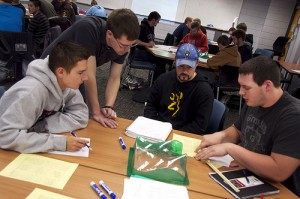 Aaron Wangberg, assistant professor in the Mathematics and Statistics department at Winona State University, is bringing calculus concepts to life for students through the Raising Calculus project.
Aaron Wangberg, assistant professor in the Mathematics and Statistics department at Winona State University, is bringing calculus concepts to life for students through the Raising Calculus project.
The project developed a new method for teaching and learning multivariable calculus in the classroom by encouraging students to actively explore calculus concepts with tactile tools.
Wangberg and a team of professors—Brian Fisher from Pepperdine University in California, Jason Samuels from The City University of New York in New York and Eric Weber from Oregon State University in Oregon developed the project and ultimately the Raising Calculus tool.
The Raising Calculus tool is a molded square with multiple peaks and valleys. Students can draw on the surface, mark points for measurement and discover relationships between calculus concepts before they are covered in classroom lecture. Students benefit from improved understanding of key ideas in algebraic formulas thus improving their performance.
Wangberg worked with WSU engineering faculty and students to develop plastic molded versions of the tool. Engineering student workers manufacture the tool using special molding equipment provided through funding from the WSU Foundation and the National Science Foundation. Since the tool is made out of molded plastic it is easier to produce making it more affordable to share the tool with others to use in the classroom.
This past summer, Wangberg and his team hosted multiple workshops across the nation, including one at WSU. The intent of the workshops was to bring classroom instructors together to learn more about how to utilize the calculus tool in the classroom. More than 35 instructors across the country will be using the materials and providing feedback on the project during the 2014-2015 academic year.
A detailed project summary can be found at: http://nsf.gov/awardsearch/showAward?AWD_ID=1246094.
The WSU Department of Math and Statistics is part of the College of Science and Engineering.
The College of Science and Engineering is committed to furthering 21st Century advances in science, technology, engineering, and mathematics (STEM) by inspiring the next generation of innovators and teachers and by promoting research and scholarship across STEM disciplines. Through a broad range of major, minor, and pre-professional programs, as well as through basic skills, interdisciplinary, and research-rich learning environments, the college endeavors to ensure the success of all students
For more information, email Aaron Wangberg at awangberg@winona.edu.
